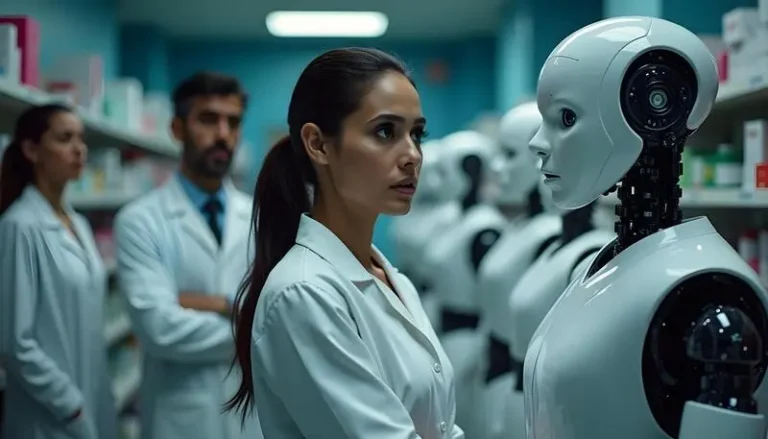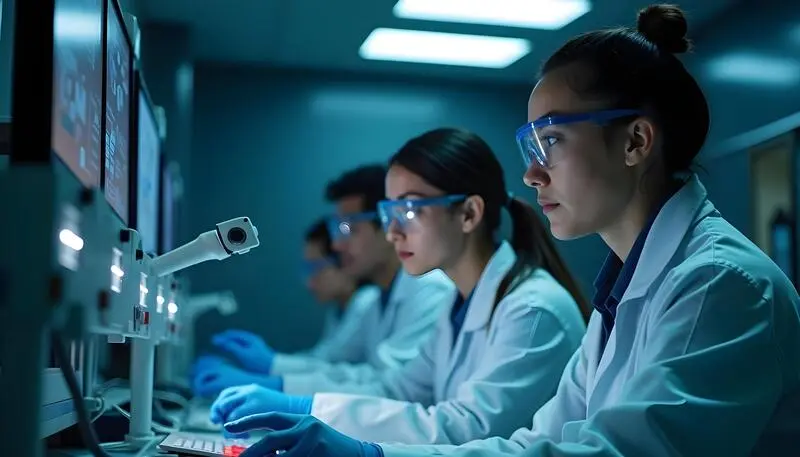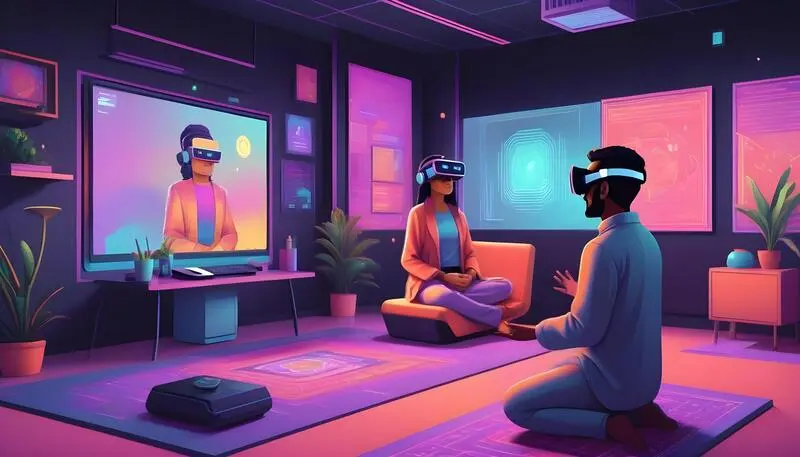Artificial Intelligence (AI) is rapidly transforming the healthcare industry. From diagnosing diseases to managing administrative tasks, AI is making healthcare more efficient and accessible. But with these advancements, there’s also concern that AI will replace certain jobs in healthcare.
In reality, AI won’t replace all healthcare jobs, but it will certainly change the way many roles are performed. In this blog, we’ll explore which healthcare jobs might be most affected by AI, and why the human touch is still crucial in many areas of patient care.
1. Medical Administrative Jobs
One of the first areas where AI is making a big impact is in administrative roles. Tasks like scheduling appointments, managing patient records, billing, and insurance claims are increasingly being automated by AI systems.
Jobs That Could Be Affected:
- Medical billing and coding: AI can automate the process of reading medical records and assigning the correct billing codes, speeding up insurance claims and reducing errors.
- Appointment schedulers: AI-powered systems can handle appointment bookings and reminders with patients, reducing the need for human schedulers.
- Medical transcriptionists: AI-based speech recognition tools can transcribe doctors' notes into electronic health records (EHRs) faster and more accurately.
Why AI Fits Here: These roles involve repetitive tasks that follow specific patterns, making them ideal for automation. AI can handle large amounts of data quickly and efficiently, freeing up human workers for more complex tasks.
2. Radiologists and Medical Imaging Technicians
AI in medical imaging has advanced significantly, and AI algorithms can now analyze X-rays, CT scans, and MRIs with remarkable accuracy. In some cases, AI can detect abnormalities in images, such as tumors or fractures, even better than human radiologists.
Jobs That Could Be Affected:
- Radiology technicians: While AI can’t fully replace human radiologists yet, it’s likely that the role of radiology technicians will change, with AI handling much of the image analysis work.
- Diagnostic imaging specialists: AI can help identify diseases in medical images, but human specialists will still be needed for complex cases, final diagnosis, and treatment planning.
Why AI Fits Here: AI is excellent at recognizing patterns in large datasets—like medical images. It can analyze scans faster, identify subtle differences, and help doctors catch diseases early.
3. Pathologists and Lab Technicians
AI is also making its way into pathology and laboratory work, where it’s being used to analyze lab results and tissue samples for signs of disease. In particular, AI can help with diagnosing cancer by examining biopsy slides and identifying cancerous cells.
Jobs That Could Be Affected:
- Lab technicians: AI can automate many lab processes, such as analyzing blood tests or tissue samples, potentially reducing the need for manual labor in laboratories.
- Pathologists: While AI might assist in examining tissue samples and detecting abnormalities, human pathologists will still be needed to oversee diagnoses and consult with medical teams.
Why AI Fits Here: Analyzing lab results is another task that involves pattern recognition, which AI excels at. Automating this process can lead to quicker and more accurate test results for patients.
4. Pharmacy Technicians
AI and robotics are increasingly being used in pharmacies to dispense medication and manage prescriptions. This helps reduce human error in filling prescriptions and speeds up the process of getting medications to patients.
Jobs That Could Be Affected:
- Pharmacy technicians: AI-powered robots can handle many tasks currently performed by pharmacy technicians, such as counting pills, dispensing medication, and managing inventory.
- Prescription processing: AI can process and check prescriptions, reducing the need for human involvement in routine pharmacy operations.
Why AI Fits Here: Automating the dispensing of medications helps ensure accuracy and efficiency, especially in high-volume settings like hospitals or large pharmacies.
5. Medical Assistants
AI is also starting to impact the role of medical assistants, who typically perform routine tasks like taking patient vitals, inputting data into electronic health records (EHRs), and managing patient paperwork.
Jobs That Could Be Affected:
- Medical assistants: AI tools and robotics could take over routine tasks like measuring blood pressure, checking patient vitals, and updating medical records, reducing the need for human medical assistants to perform these tasks.
Why AI Fits Here: AI can streamline many of the repetitive tasks that medical assistants do, freeing them up to focus on more patient-centered duties that require a human touch.
6. Telemedicine and AI Chatbots
Telemedicine and AI chatbots are changing how patients interact with healthcare providers. AI-powered virtual assistants can answer common health questions, provide medical advice, and even help patients monitor chronic conditions from home.
Jobs That Could Be Affected:
- Frontline healthcare workers: AI chatbots can assist with answering routine medical questions and triaging patients, reducing the demand for human frontline workers in certain cases.
- Telehealth assistants: Virtual assistants powered by AI can handle initial patient inquiries, assess symptoms, and recommend next steps, which might reduce the need for human telehealth staff for routine consultations.
Why AI Fits Here: AI-driven chatbots can provide quick, reliable answers to basic medical questions, reducing wait times and helping healthcare systems manage high patient volumes.
The Human Element: Why AI Won’t Replace Every Healthcare Job
While AI is making strides in many areas of healthcare, there are still many jobs that AI can’t replace—especially those that require human empathy, critical thinking, and complex decision-making.
Healthcare Jobs That Are Safe from AI:
- Doctors and surgeons: AI can assist in diagnosis and treatment planning, but it can’t replace the hands-on expertise and decision-making required in complex cases.
- Nurses: AI might help with routine tasks, but the emotional support, compassion, and personal care that nurses provide can’t be replicated by a machine.
- Therapists and mental health professionals: While AI can offer virtual counseling or support tools, it can’t provide the deep human connection and understanding needed for effective mental health care.
Final Thoughts: Will AI Replace Healthcare Jobs?
AI is already reshaping many healthcare jobs by automating routine tasks and improving efficiency. While certain roles may be reduced or transformed, the most valuable roles in healthcare—those requiring human empathy, decision-making, and direct patient care—are safe from being fully replaced by AI.
Rather than seeing AI as a threat, it’s important to see it as a tool that can help healthcare professionals focus on what matters most: patient care. By embracing AI, healthcare workers can work more efficiently, with technology supporting their work, not replacing it.
Curious about how AI will change the future of healthcare? Contact us to learn more about how you can leverage AI technology while keeping the human touch in healthcare.




